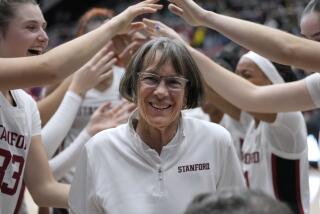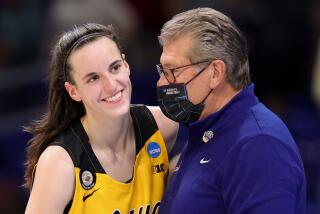Coaches Resent Breakfast Game : Women’s basketball: Saturday’s 9:30 a.m. start is dictated by television.
- Share via
For some, advancement isn’t measured in conventional terms.
There is progress . . . and then there’s progress for women’s basketball.
The issue was television at the women’s Final Four at the Sports Arena this weekend, and the coaches of the participating teams stepped up and took their shots during a conference call Tuesday.
They were irked by the 9:30 a.m. start for Saturday’s first semifinal and the prospect of playing the semifinals on one day and the final the next. Each, though, bowed to the inevitable.
“Twenty years ago, we played two games in one day,” Stanford Coach Tara VanDerveer said. “So we’ve made progress.
“It’s very unfair. But I also understand. We’re giving up a lot to be on TV, and we gain a lot by being on TV.”
Said Western Kentucky Coach Paul Sanderford, whose team will play Southwest Missouri State in the first semifinal: “Because of the state women’s basketball is at right now, we need CBS. We need national television. . . . We will be there at 9:34.”
As far as Virginia Coach Debbie Ryan is concerned, there is the issue of control. And she doesn’t believe the coaches have any valid choice. It’s either no TV or the games on CBS’ terms, with little room for compromise.
Her team played games on consecutive days in last year’s tournament, the Cavaliers losing to Tennessee in overtime in the title game.
“I’m hoping our games grow to a point where we can control things a little bit better,” she said. “Going into that situation (last year), I really wasn’t concerned.
“Coming out, I can tell you, it is extremely, extremely unfair to the players. Not only is it particularly unfair to the coaching staffs, it is doubly unfair to the players. The players just cannot recover in that period of time.
“There is a lot required from these players, emotionally, prior to the games. All of the things they go through, we don’t even give them a chance to recover. I had five players finish with cramps in that overtime game. And I know they couldn’t have gone a second overtime. They were beyond being tired. I think we need to take a look at that aspect.”
Southwest Missouri State Coach Cheryl Burnett wasn’t as bothered by the early start as by the potential for back-to-back games.
The Bears’ high-energy, full-tilt playing style presents another potential problem.
“My concern in playing back-to-back days--with our style--we would deal with the dead-legs syndrome,” she said. “In playing pressure-type defense, it’s very tough to play back to back.”
Said Sanderford: “What that does is give the team with depth and a system a better opportunity to win a national championship. I do think there should be some changes in the future. I think the early start time is one thing. But I do think back to back is very unfair, especially for the coaches.”
VanDerveer is just worried about how a small early-morning crowd will look on television.
“I don’t know who in Los Angeles will come to the game at 9:30 in the morning,” VanDerveer said. “That’s one thing that concerns me. Part of the excitement of the game is the fan and the fan watching the game. We want to project what’s really happening out there. And what’s really happening is that a lot people are watching women’s basketball.”
At Charlottesville, Ryan pointed out that an 11 a.m start for the East Regional final on Saturday could have been a problem, but 8,715 came to watch Virginia defeat Vanderbilt in the final.
In this Final Four, an unexpected bonus has been the emergence of Southwest Missouri State. The Bears, who will play in the early game, could bring more than 1,000 fans with them to Los Angeles.
More to Read
Go beyond the scoreboard
Get the latest on L.A.'s teams in the daily Sports Report newsletter.
You may occasionally receive promotional content from the Los Angeles Times.











